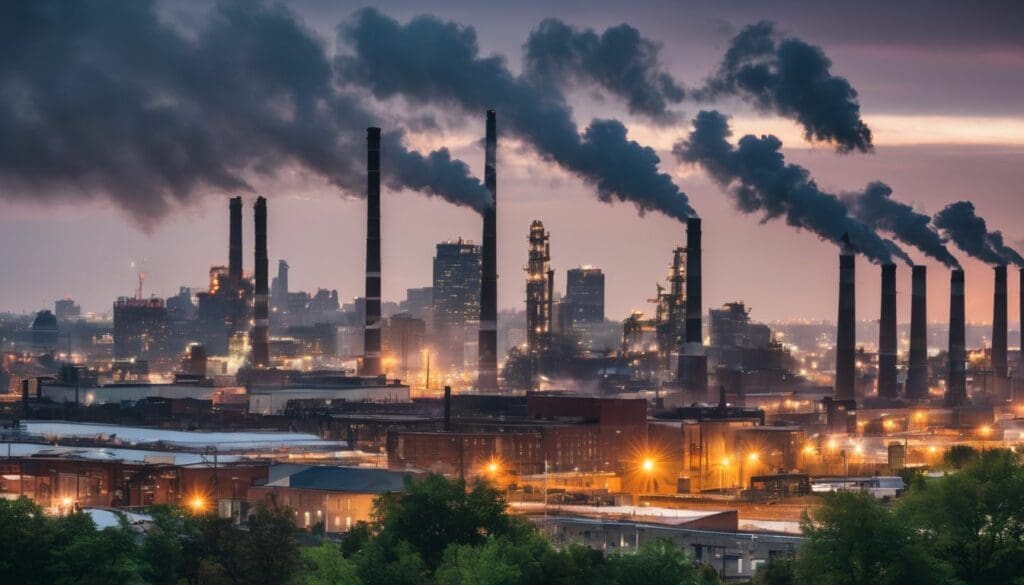As the planet warms up, we’re all feeling the heat of climate change. Fossil fuels are responsible for a whopping 75% of global greenhouse gas emissions. This article shines a light on why curbing our fossil fuel use is key to cooling down our world.
Keep reading – it’s time to act!
Key Takeaways
- Fossil fuels like coal, oil, and natural gas are the main sources of carbon emissions leading to global warming. When burnt, they release carbon dioxide which traps heat in our atmosphere.
- Despite awareness of their environmental impact, worldwide we still depend heavily on fossil fuels for energy. Efforts need to be increased to transition to renewable energy sources such as solar and wind power.
- Predictions suggest that demand for fossil fuels will rise due to growing populations and industrialisation. This could lead to more extraction from difficult places, harming the environment further.
- Renewable energy solutions offer alternatives with lower emissions compared to fossil fuels. Utilising solar, wind, hydroelectric power can help reduce our carbon footprint and combat climate change.
- Governments are encouraged to phase out fossil fuel use by adopting policies that promote renewable energies. The financial benefits include job creation in new industries related to clean energy technologies.
Fossil Fuels and the Environment
Fossil fuels, such as coal, oil, and natural gas, are major contributors to global warming due to the release of greenhouse gases when burned. Despite efforts to transition towards renewable energy sources, the world’s ongoing reliance on fossil fuels poses a significant challenge in combating climate change.
How fossil fuels contribute to global warming
Burning coal, oil, and natural gas releases huge amounts of carbon dioxide into the atmosphere. This greenhouse gas traps heat from the sun, causing Earth’s average temperature to rise.
Energy production using these fuels is a major culprit for increasing our global carbon footprint.
Every day, cars, factories, and power plants consume fossil fuels at an alarming rate. These activities release not only carbon dioxide but also other harmful gases such as methane and nitrous oxide which intensify the greenhouse effect.
The result is a warming climate that disrupts weather patterns and melts polar ice caps. Transitioning to low-carbon energy systems becomes increasingly urgent to prevent further damage to our environment and mitigate the climate crisis.
Ongoing reliance on fossil fuels
Fossil fuels continue to play a significant role in meeting global energy demand. Despite growing awareness of their adverse environmental impact, the world still heavily relies on fossil fuels for power generation, transportation, and industrial processes.
The continued use of these non-renewable resources contributes to escalating carbon emissions, exacerbating the challenge of combating global warming and transitioning to low-carbon energy systems.
As predictions for future fossil fuel production remain high, it is imperative to explore feasible alternatives that align with sustainable economic development and diminish the environmental impact.
The ongoing reliance on fossil fuels underscores the urgency of accelerating the transition towards clean and renewable energy sources. Mitigating climate change requires rethinking current energy systems and adopting new technologies to navigate an increasingly carbon-constrained world.
Predictions for future fossil fuel production
Experts predict that global demand for fossil fuels will continue to rise in the coming decades, driven by growing populations and industrialisation in developing countries. This surge in demand is expected to put pressure on existing reserves, leading to increased extraction efforts in more challenging environments such as deep-sea drilling and unconventional sources like tar sands and shale oil.
As a result, the environmental impact of fossil fuel production is also likely to escalate, posing greater risks to ecosystems and exacerbating climate change. In response, there is a pressing need for accelerated efforts towards transitioning to low-carbon energy systems and investing in renewable resources.
The future of fossil fuel production presents significant challenges that call for proactive measures towards sustainable energy solutions. With the mounting pressures of a carbon-constrained world, it becomes imperative to explore alternatives and embrace clean, sustainable energy sources while mitigating the reliance on traditional fossil fuels.
Impact of Fossil Fuels on Global Warming
Rising carbon emissions from burning fossil fuels have led to an increase in global temperatures, resulting in more frequent and severe climate change events. The effects of fossil fuels on the planet are becoming increasingly evident, making it crucial to explore alternative energy sources and transition away from our reliance on them.
Rising carbon emissions from burning fossil fuels
Burning fossil fuels releases carbon emissions, contributing to global warming and climate change. This process leads to the accumulation of greenhouse gases in the atmosphere, trapping heat and raising global temperatures.
As a result, extreme weather events become more frequent, and ecosystems face significant disruptions.
Rampant burning of fossil fuels causes a surge in carbon emissions. These emissions are a primary driver of global warming and its associated impacts on the environment. As such, curbing these emissions is crucial for mitigating the effects of climate change and preserving the planet for future generations.
Effects on climate change and the planet
Burning fossil fuels releases carbon dioxide and other greenhouse gases into the atmosphere, trapping heat from the sun and warming the planet. This leads to rising global temperatures, changing weather patterns, melting ice caps, and rising sea levels.
The impact on wildlife and ecosystems is profound, as many species struggle to adapt to these rapid changes. Extreme weather events such as hurricanes, floods, and droughts become more frequent and intense.
Reducing our reliance on fossil fuels is crucial for mitigating these effects. Transitioning towards low-carbon energy sources like wind, solar, and hydroelectric power can help limit further damage to the environment while also creating a sustainable future for generations to come.
Embracing clean energy technologies offers hope in combating climate change and preserving our planet’s delicate balance. Moving away from fossil fuels is essential for protecting both our environment and future generations.
Alternatives to Fossil Fuels
Renewable energy sources such as solar, wind, and hydroelectric power offer a promising alternative to fossil fuels. These low-carbon energy systems have the potential for widespread use in a carbon-constrained world.
Renewable energy sources
Renewable energy sources offer sustainable alternatives to fossil fuels, reducing carbon emissions and mitigating the impact of global warming. They include solar power, harnessing energy from the sun through photovoltaic panels, and wind power, using turbines to generate electricity. Biomass energy involves converting organic waste into fuel, while hydropower harnesses the energy of flowing water to produce electricity. Geothermal energy utilises heat from the Earth’s core for heating and electricity generation. Each of these renewable sources presents a viable solution for transitioning away from fossil fuels in a low-carbon energy system.
Benefits and potential for widespread use
Renewable energy sources offer significant benefits, including reduced carbon emissions and a lower environmental impact. Solar, wind, hydro, and geothermal power are abundant and can be harnessed sustainably.
These alternative fuels have the potential for widespread use in a carbon-constrained world, offering long-term solutions to the fossil fuel crisis.
Transitioning towards low-carbon energy systems is essential for combating global warming. The widespread adoption of renewable energy sources will play a crucial role in achieving this goal.
Embracing these alternatives can lead to a more sustainable future for our planet.
Transitioning Away from Fossil Fuels
Governments are being urged to phase out fossil fuel production and consumption, with a focus on the financial and economic implications of such a transition. This shift is crucial in creating a low carbon energy system for a carbon-constrained world.
Calls for governments to phase out fossil fuel production and consumption
Governments are being urged to phase out fossil fuel production and consumption. This is crucial for combating the impact of global warming.
- Transitioning to low – carbon energy systems is essential.
- Implementing policies to support low – carbon energy sources is imperative.
- Encouraging investment in renewable energy technologies is vital.
- Promoting the adoption of clean energy solutions is necessary.
Financial and economic implications
Calls for governments to phase out fossil fuel production and consumption are driven not only by environmental concerns but also by the potential financial and economic benefits. Transitioning towards low-carbon energy systems can stimulate job creation, innovation, and investment in renewable energy technologies.
A shift to a carbon-constrained world could lead to reduced healthcare costs associated with air pollution-related illnesses, creating a more sustainable and resilient economy.
The move away from fossil fuels presents opportunities for industries to adapt and thrive in a rapidly changing energy landscape, fostering economic growth while mitigating the risks of climate change.
Conclusion: The Need for Urgent Action to Combat Global Warming.
The urgent need for action to combat global warming is undeniable. Governments must prioritise the transition towards low-carbon energy systems. Embracing renewable energy sources can lead us towards a carbon-constrained world.
Every individual’s support for conservation and environmental protection is crucial for a sustainable future.
FAQs
1. What does the future look like for fossil fuels with global warming concerns?
The future of fossil fuels is uncertain due to global warming, as there’s a growing push towards low-carbon energy systems in a carbon-constrained world.
2. Why are low-carbon energy systems important for our planet?
Low-carbon energy systems are crucial because they reduce greenhouse gas emissions, helping to slow down global warming and protect the environment.
3. Can we stop using fossil fuels completely?
While it’s challenging to quit using fossil fuels immediately, many countries are working hard to replace them with low-carbon alternatives that contribute less to global warming.
4. How will a carbon-constrained world affect how we use energy?
In a carbon-constrained world, we’ll need to change our energy consumption habits and invest more in lowcarbon technologies that help cut down the harmful effects of global warming.





